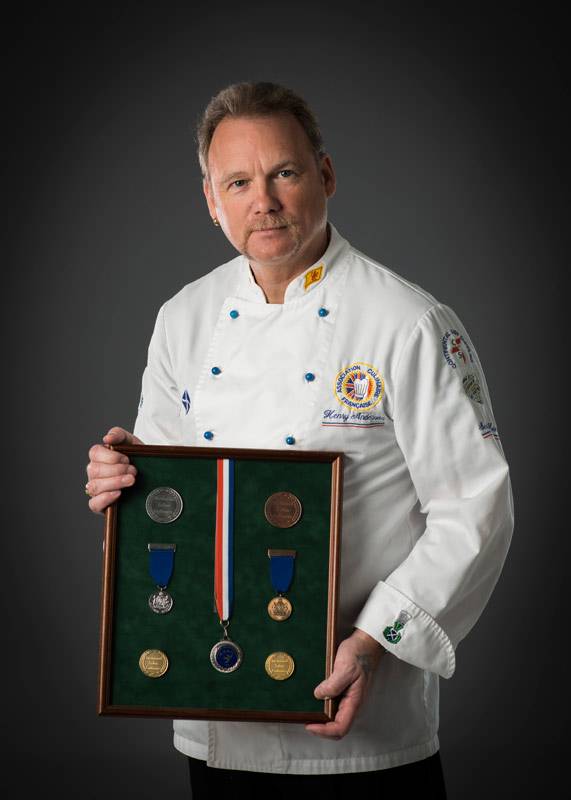
Master Chef Henry Anderson of Marine Catering Services (MCS) has seen it all in his career both as a Catering Consultant and Chef onboard sea going vessels, oil rigs and land based units.
He is the founder of MCS and is passionate about his profession. “It’s all about ensuring that proper procedures and structures are in place for the catering staff to implement and follow. Without these systems, some kitchens onboard vessels are not running correctly to industry standards and requirements when I first visit them,” he said. “Cooks need to be organized and methodical in their approach to cut out unnecessary expenditure due to lack of preparation and poor planning.”
Anderson is adamant you can deliver better quality and a higher culinary standard of food at sea, and in line with client’s budgets, through proper training. This includes basics such as correct defrosting procedures and ensuring that your catering staff never re-freeze any product as this can cause illness among the crew. Also a failure to follow correct procedures can create big problems for ship management companies with port authorities and private insurance claims if they do not fully comply with the 1990 Food Act.
“Every aspect of a vessel’s day-to-day budget should be scrutinised as implementing proper procedures can save ship management companies thousands of pounds per vessel each year,” he warned.
“If a ship with 20 crew wastes just 50 grams of Beef Topside (costing $12.00 per kg) per person, this equates to a loss of one kilo a day. This might not sound that much but the annual wastage cost per vessel works out at $4,380. Multiply that by the number of vessels in the fleet and it doesn’t take a mathematician to work out that a lot of money is being wasted through this example of only one product line. So when you are working with large quantities it is important to be vigilant to ensure budgets are met.”
As a consultant, Henry passes on his vast experience and knowledge to train cooks, galley staff, stewards and stewardesses’ to ensure there is no unnecessary food wastage in the catering department – a pre-requisite to reducing overstocking. He can show catering staff how to create appetising menus containing the correct nutritional values while keeping within the set daily food budget. Henry is passionate about his profession and in passing on his vast experience to cooks and galley staff, stewards and stewardesses to ensure they receive the correct standard of knowledge required to attain their level of industry standards in line with ILO/MLC requirements.
All too often catering staff can fall into bad habits by relying too heavily on packet foods instead of cooking with fresh ingredients which is not only more cost effective but also produces tastier and more healthy meals. Bad stock rotation and poor food storage standards are also common issues that Henry and his staff find when visiting vessels which they rectify by training the catering teams to follow and implement correct procedures and systems.
According to Mr Anderson, MCS can always find ways to make savings in a client’s daily food costs by reducing food wastage. This ranges from teaching cooks which parts of meat to use so the yield is optimised, to showing them how to use the correct product for each prepared dish.
MCS also has a victualing program to prevent food overstocking or to reduce a buildup of out-of-date stock while still providing nutritious menus to multinational crews on a budget. The program includes financial indicators so a check can be kept on catering expenditure on a daily, weekly or monthly basis.
“It’s all about ensuring that proper procedures and structures are in place for the culinary staff to implement and follow. Without these systems, it can result in problems with ILO/MLC regulations which can accrue financial problems for clients,” said Mr Anderson.
“MCS training ensures cooks are correctly organized and methodical in their approach to industry requirements. They are trained to cut out unnecessary expenditure due to a lack of preparation and poor planning.”
Henry has proved time and time again that you can deliver better standards onboard any type of vessel in all criterias and industry standards, through a proper training program and development of all staff. He is passionate about passing on his exacting standards in food hygiene, food preparation, stock rotation, food quality, accommodation standards and requirements within industry laws.
MCS believes that a face-to-face training program is far better than distance learning via a course on a computer. Only by being onboard in person can the trainer truly assess the knowledge gap of the catering staff and tailor the training accordingly. His enthusiasm is very infectious and this helps to re-energise catering teams who may have lost their way a little. Another advantage to being onboard is that MCS trainers can immediately answer any questions asked by trainees which distance learning training program may not have considered. It also helps to break down language barriers as the trainer can check that all trainees have fully understood everything before moving onto the next section.
MCS will also ensure that catering staff, Masters and ship management teams are trained to the required level of ILO/MLC 2006 requirements and comply with Hazard Analysis Critical Control Points (HACCP) which covers food safety management, stock rotation, menu planning and eliminating waste. So shipowners can be confident that using MCS to train their teams will cut costs, improve the quality of food being served and boost morale.



